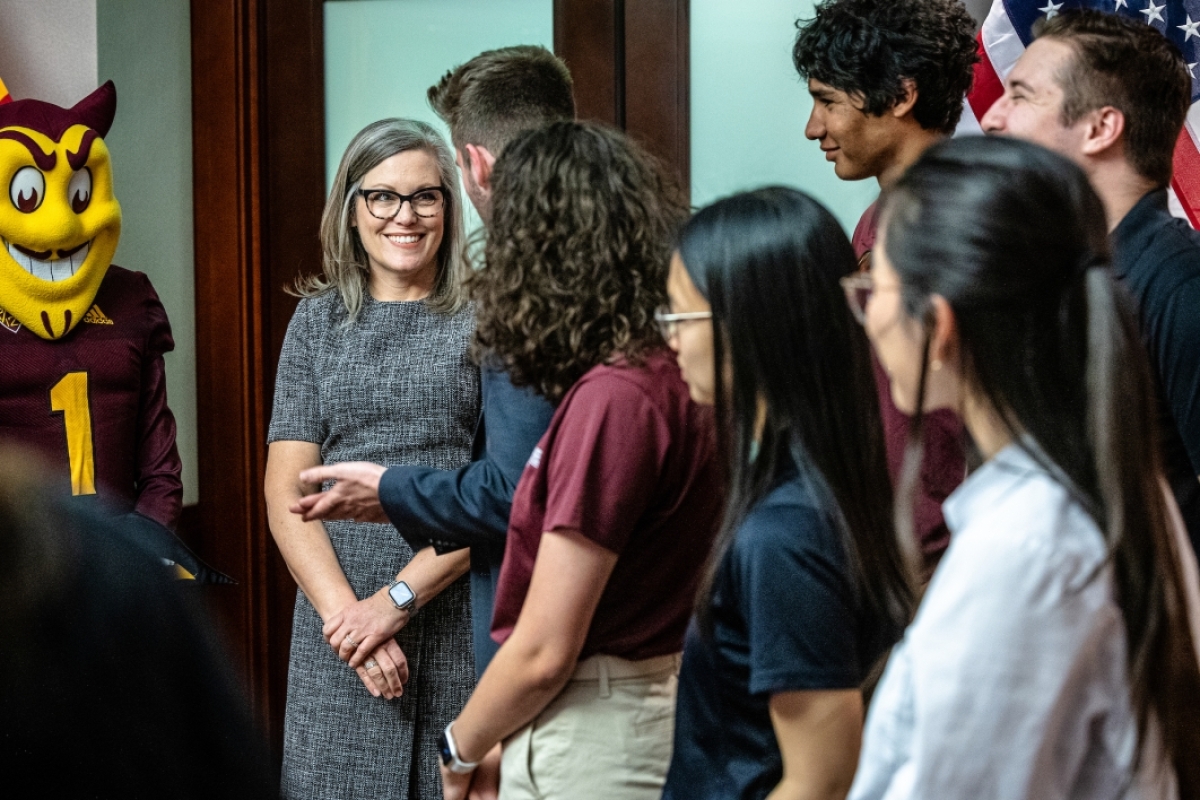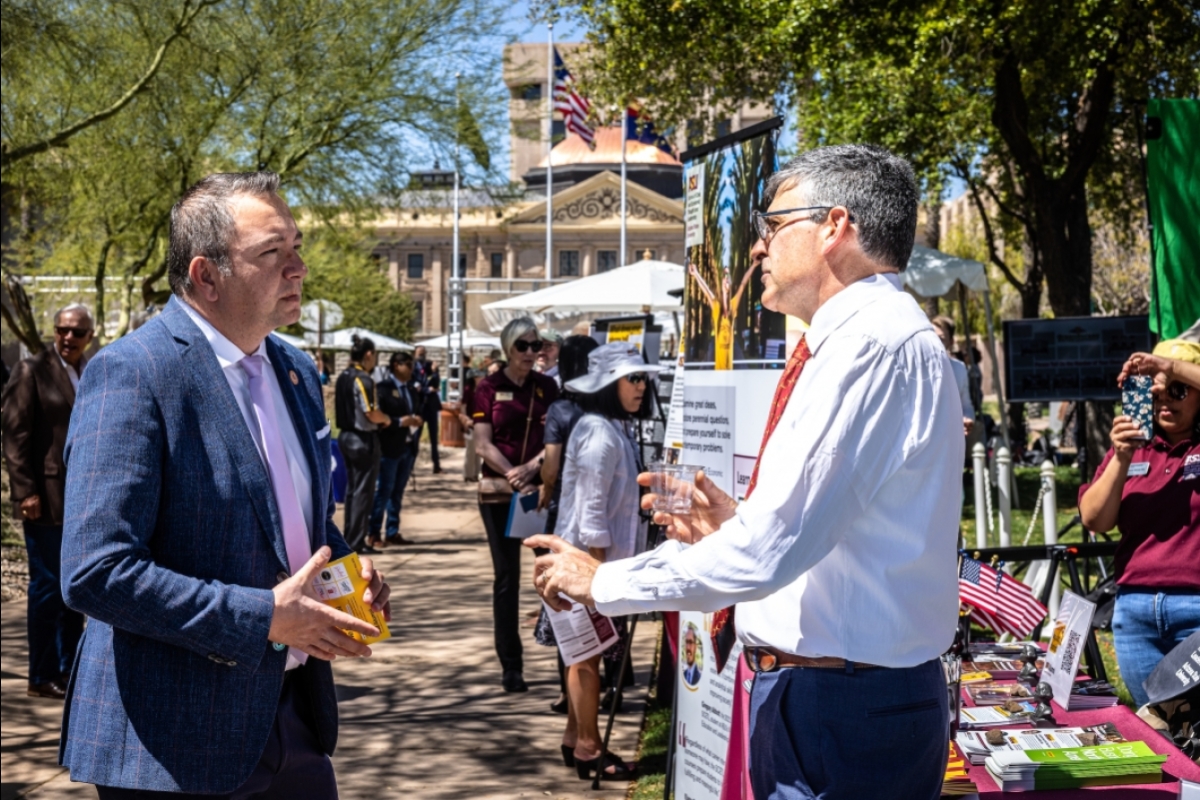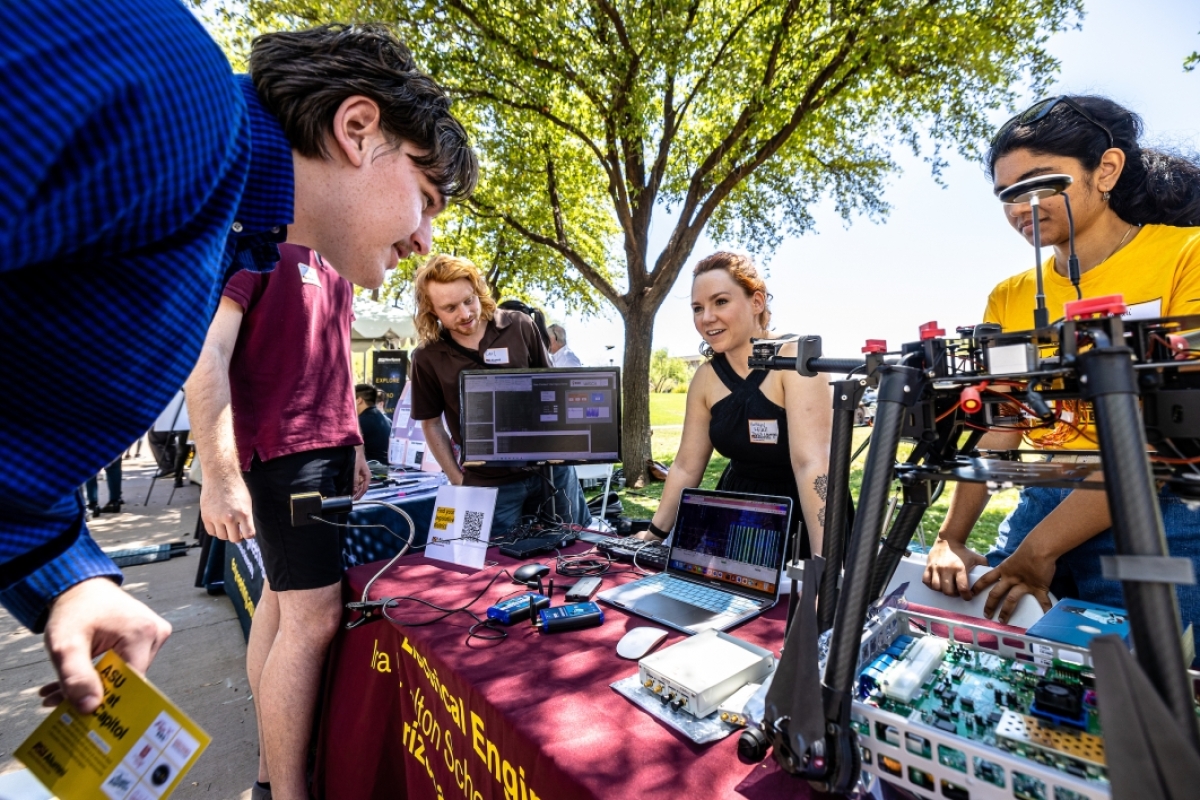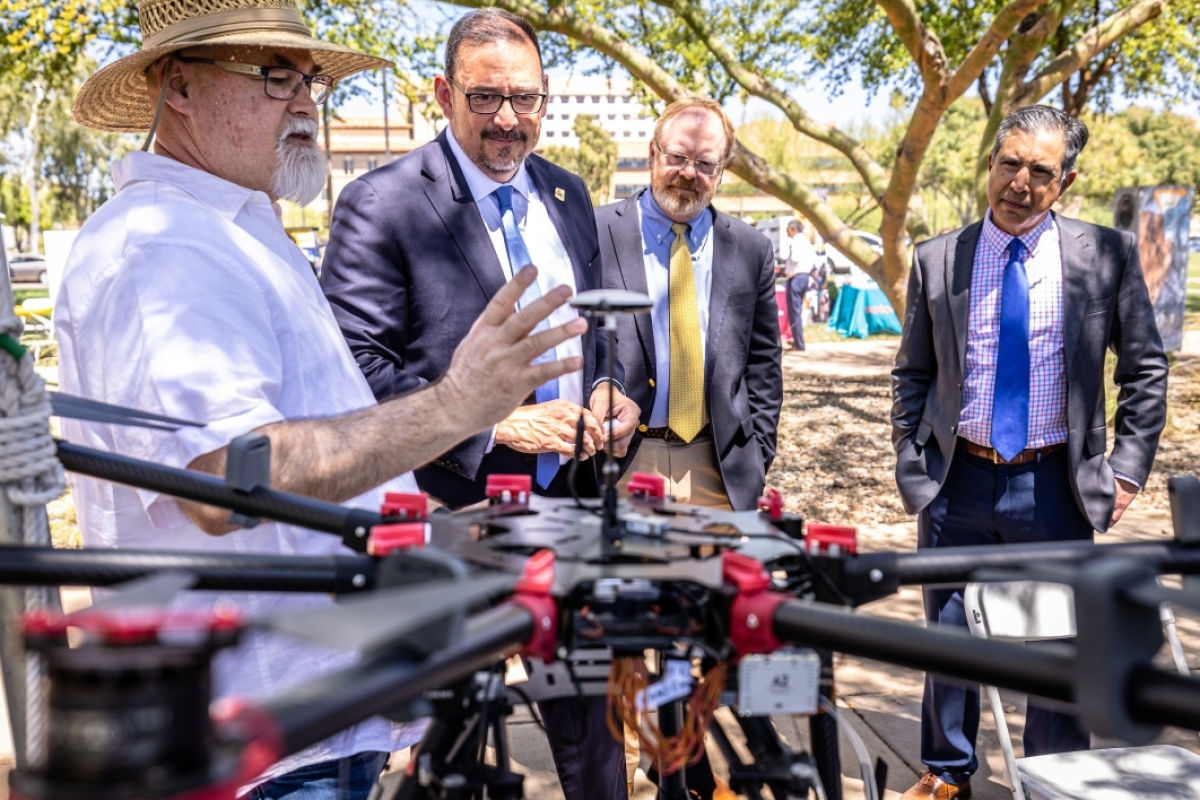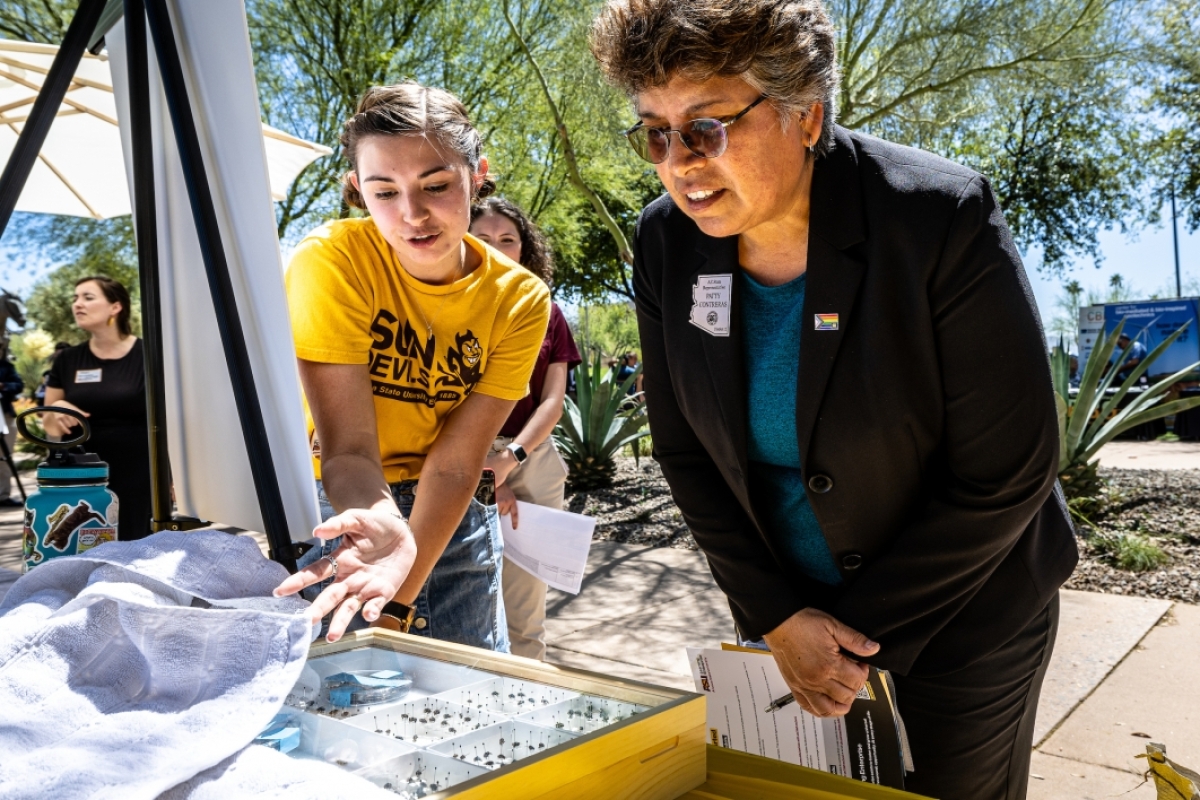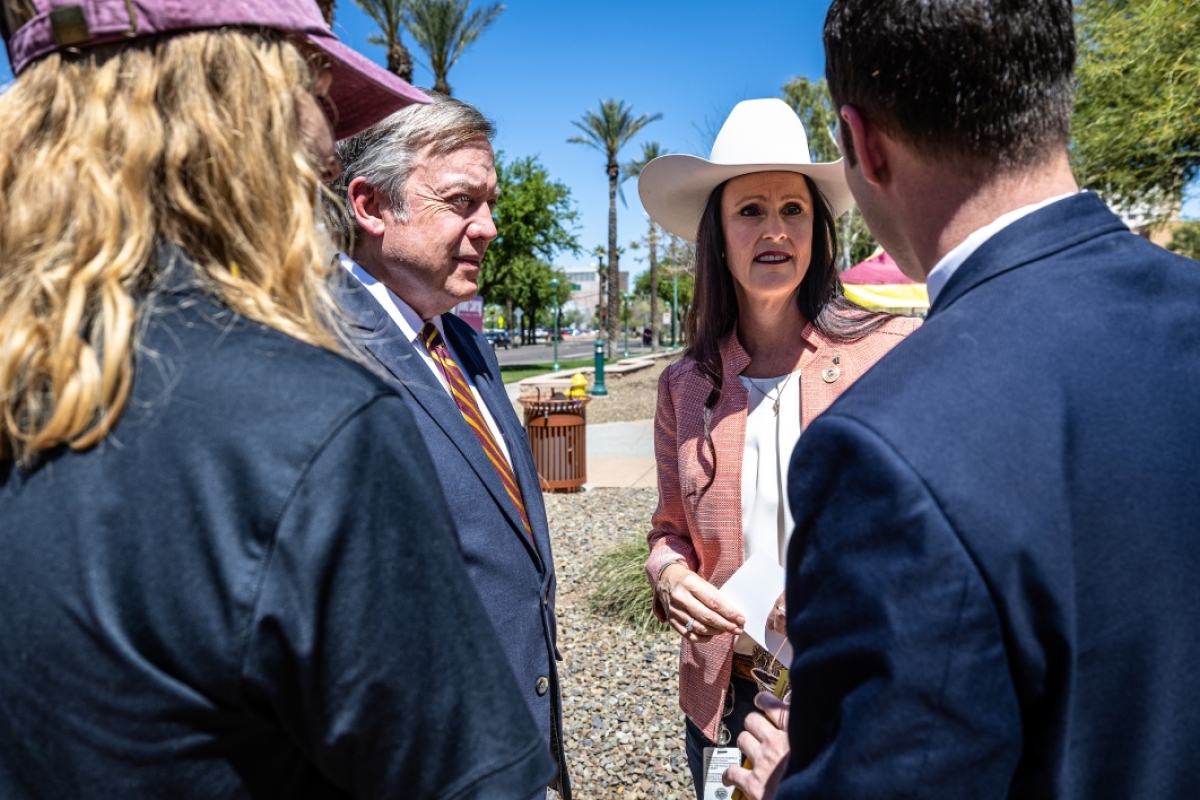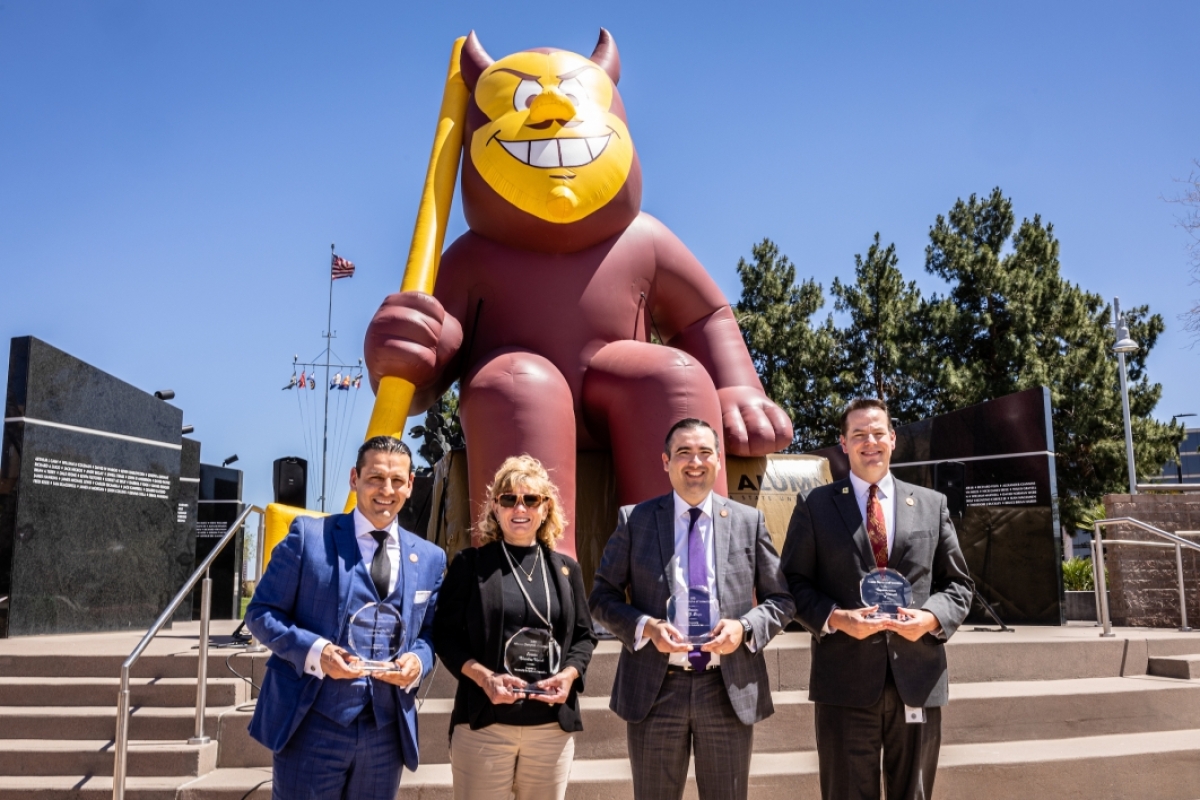ASU Day at the Capitol showcases global solutions for the future
Interdisciplinary collaborations across the university promise innovative solutions

Solutions that touch many facets of life in Arizona and beyond were on display from Arizona State University at the state Capitol on Tuesday.
Hundreds of alumni, faculty and staff gathered on the Wesley Bolin Memorial Plaza as part of the annual ASU Day at the Capitol to showcase the university’s research and innovations that keep ASU on the forefront of solving some of the biggest challenges and creating opportunities for a better future.
Nearly a dozen colleges and units were represented this year with displays that featured manufacturing technology, artificial intelligence, water research, affordable housing, criminal justice reform, space exploration and more.
Serving our local community
The Morrison Institute for Public Policy, a nonpartisan research organization, shared their latest research on affordable housing in Arizona. Reports from the Morrison Institute highlight potential solutions for lawmakers to consider based on data.
Ashlee Tziganuk, a research analyst at the institute, said this is one of the state’s biggest challenges, since Arizona is one of the only states that doesn't mandate inclusionary zoning — requiring a certain percentage of multi-unit buildings to be zoned for affordable housing.
“In Arizona, most of our land is known for single-family homes and that prevents us from being available to build multi-family homes, or even smaller density complexes,” she said. “Really the main thing is that we need to be more creative with our zoning and allow for more flexibility. The goal is obviously to create more opportunities for affordable housing.”
When it comes to another important Arizona issue — water usage, rights and access — Susan Craig, program director of the Global Institute of Sustainability and Innovation, said that while we’re making strides in legislation, the issue reaches far beyond Arizona.
“The $1.2 billion water infrastructure bill will certainly support our pillars of water technology and conservation in our state, but I hope people remember that this is truly a global matter — and one that we’re proud to lead at ASU,” Craig said.
One socioeconomic concern facing the state — and the nation — is criminal justice and police reform. School of Social and Behavioral Sciences Associate Professor Nicole Roberts and Assistant Professor Laura Smalarz explained how their research affects this area.
Roberts’ research focuses on the study of emotion and on the cultural and biological forces that shape emotional responses. She and her students investigate how ethnicity and culture influence emotional displays and experience. Smalarz's research investigates the legal system from a psychological perspective. She and her team work to prevent wrongful convictions by establishing evidence-based practices for collecting eyewitness identification evidence, police interrogations, criminal stereotypes, and perceptions.
During the event, Smalarz hosted an activity to test eyewitness identification skills by having participants watch a short 30-second video of a robbery. Viewers were then asked to look at a lineup and pick the suspect from a sheet of about eight mugshots.
The kicker: The fictitious perpetrator's photo wasn't in the lineup; something that Smalarz said happens far too often in police interviews and interrogations, and can cause many wrongful convictions nationwide. There are no national requirements for procedures that police should use when administering lineups.
“Twenty-five states have scientific best practices required at a state level. Arizona is not one of them ... ,” she said. “One of those best practices includes telling an eyewitness that it’s OK if they don’t recognize the perpetrator in the lineup they’re given.”
Beyond our borders
In the School of Transborder Studies, students learn about the economic and political impacts of life along international borders, including migration, health and applied social policy, and language and learning.
Edward Vargas, associate professor at the school, studies how these factors contribute to the well-being of vulnerable, mostly Hispanic, families.
“To my knowledge, we’re the only school in the country doing this work,” he said. “It’s crucial that our students know where they came from – and for others who are not Latino to understand the very complex nature of immigration,” Vargas said.
His colleague Irasema Coronado, whose research focuses on the politics of the U.S.-Mexico border region, including environmental policy, activism, human rights and the role of women in politics, agrees.
“Our Hispanic students are the future,” she said. “We’ll be looking to them as our future leaders.”
The event also featured ASU researchers, students and professors who are working on the future of manufacturing in Arizona and beyond.
ASU's role in the New Economy Initiative builds on its contributions to high-tech industries like semiconductor manufacturing and brings together multidisciplinary minds across the fields of engineering, technology and biomimicry.
Dhruv Bhate, an associate professor in the School of Manufacturing Systems and Networks, said the initiative will bring immense possibility and opportunity for both the state economy and future careers for students within the rapidly-growing semiconductor industry.
“As one of the most recent schools in the Ira A. Fulton Schools of Engineering, we have the opportunity now to address manufacturing here, locally,” he said. “I love to tell everybody that manufacturing is where the rubber meets the road. We can design things on computers, we can write code, we can use our social media, whatever we want, but in the end software resides on hardware.
“So whether you look at computers or smartphones or tablets or cars or spacecraft, they all in the end have to be made. When we focus on innovation and design, a lot of our inspiration comes from nature.”
When it comes to spacecraft, ASU’s long-standing partnership with NASA and space exploration was also on display from the Interplanetary Initiative and the School of Earth and Space Exploration, including a radio transmission demonstration showing live radio frequency communications between two satellites.
Back on Earth, the Partnership for Economic Innovation took a moment to recognize leaders who have been helpful in advancing many of ASU’s missions and initiatives, including the New Economy Initiative, water security, workforce development and supporting local alumni-operated businesses by honoring them with the inaugural Arizona Champions of Innovation Awards. Awardees were Sen. Christine Marsh, Sen. T.J. Shope, Rep. Marcelino Quiñonez and Rep. Justin Wilmeth.
Other colleges and units who took part in the event were: ASU Athletics, College of Global Futures, College of Health Solutions, Edson College of Nursing and Health Innovation, Kyl Center for Water Policy at the Morrison Institute, Mary Lou Fulton Teachers College, Pat Tillman Veterans Center and Watts College of Public Service and Community Solutions.
More Science and technology

ASU author puts the fun in preparing for the apocalypse
The idea of an apocalypse was once only the stuff of science fiction — like in “Dawn of the Dead” or “I Am Legend.” However these days, amid escalating global conflicts and the prospect of a nuclear…

Meet student researchers solving real-world challenges
Developing sustainable solar energy solutions, deploying fungi to support soils affected by wildfire, making space education more accessible and using machine learning for semiconductor material…

Miss Arizona, computer science major wants to inspire children to combine code and creativity
Editor’s note: This story is part of a series of profiles of notable spring 2024 graduates. “It’s bittersweet.” That’s how Tiffany Ticlo describes reaching this milestone. In May, she will graduate…
